高考第二轮复习:情态动词课件(50张)
文档属性
| 名称 | 高考第二轮复习:情态动词课件(50张) | 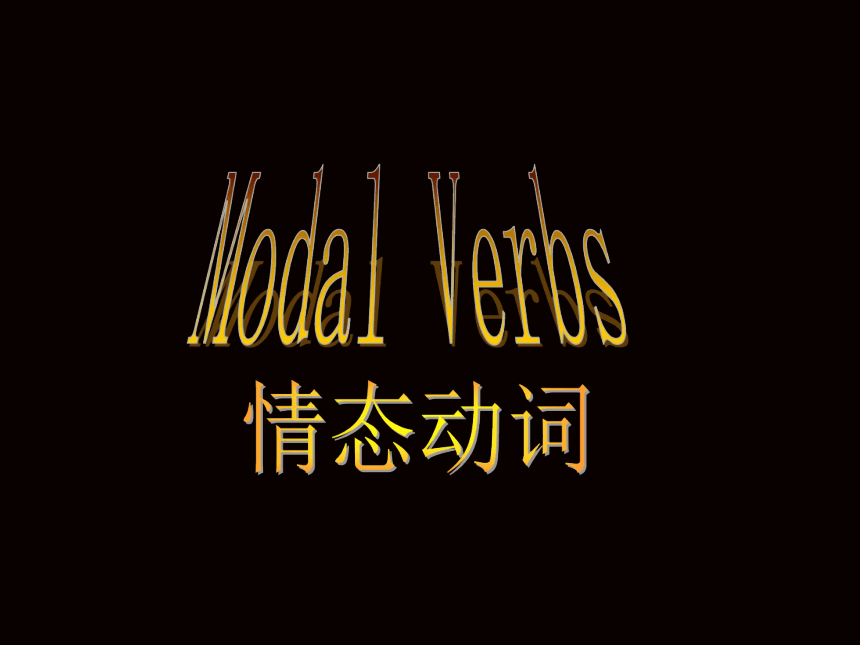 | |
| 格式 | zip | ||
| 文件大小 | 407.9KB | ||
| 资源类型 | 教案 | ||
| 版本资源 | 通用版 | ||
| 科目 | 英语 | ||
| 更新时间 | 2019-07-13 22:24:11 | ||
图片预览


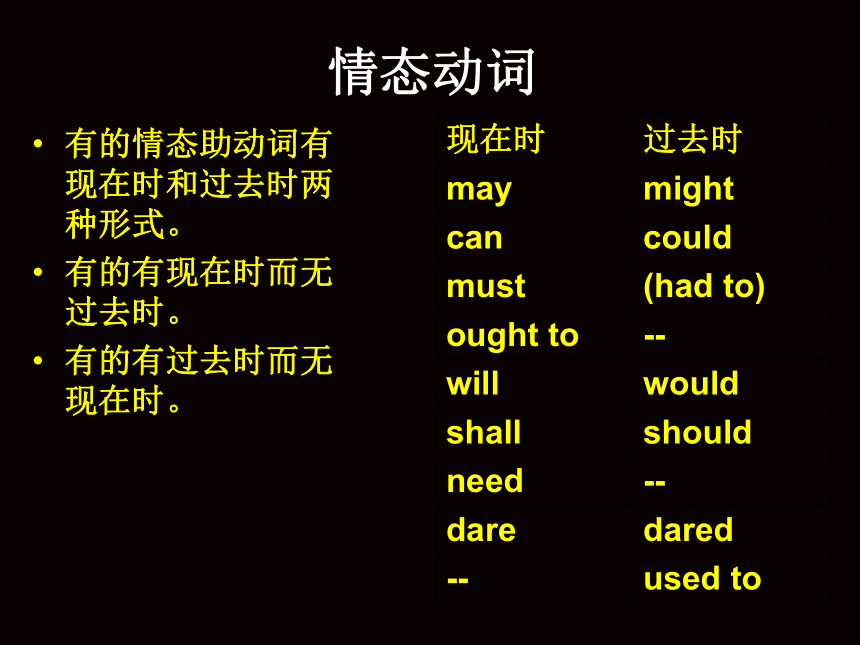
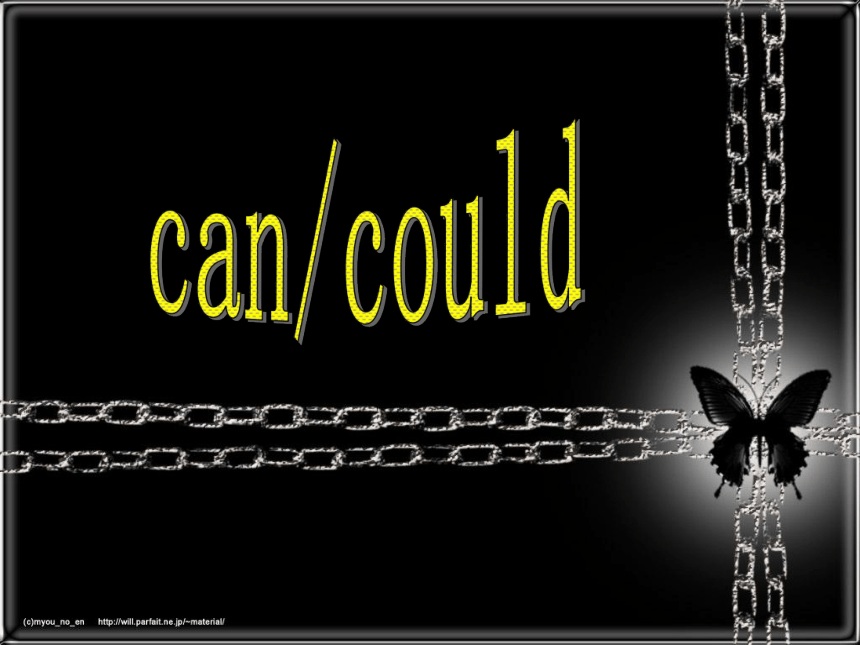
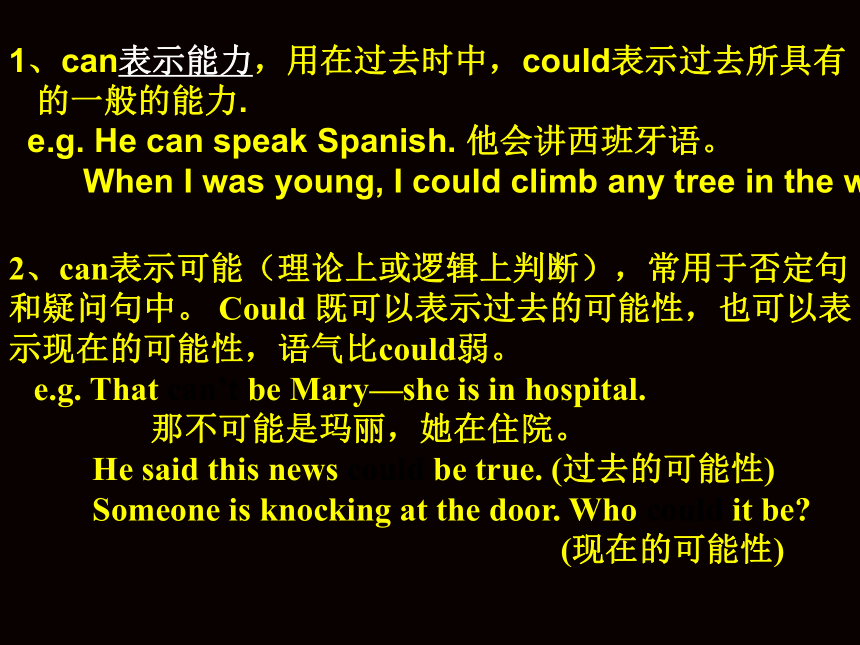
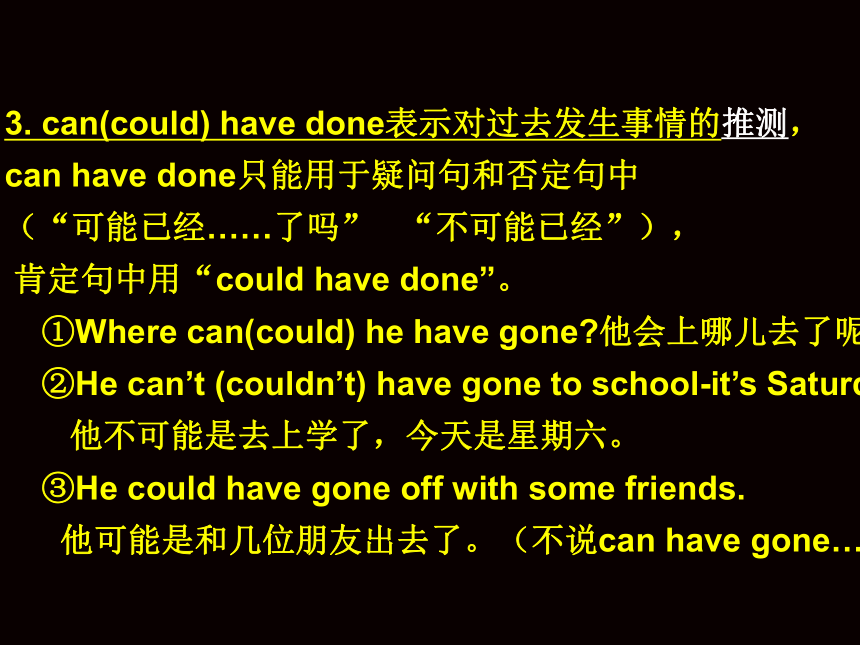
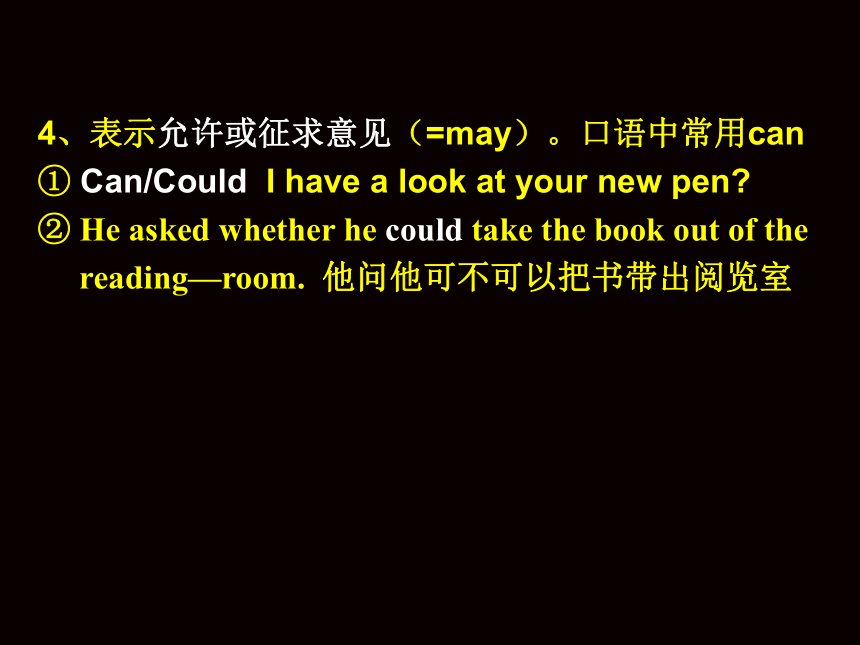
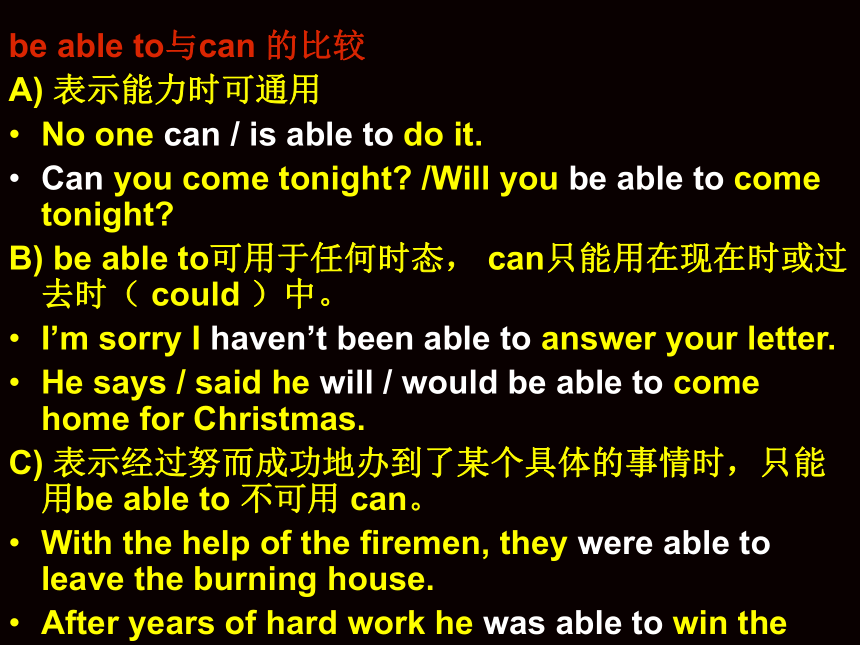
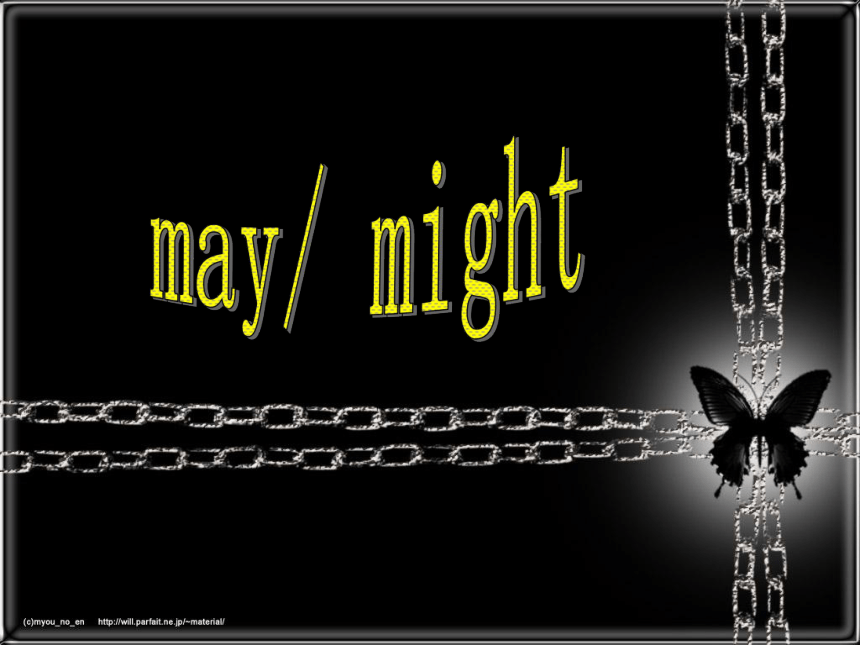
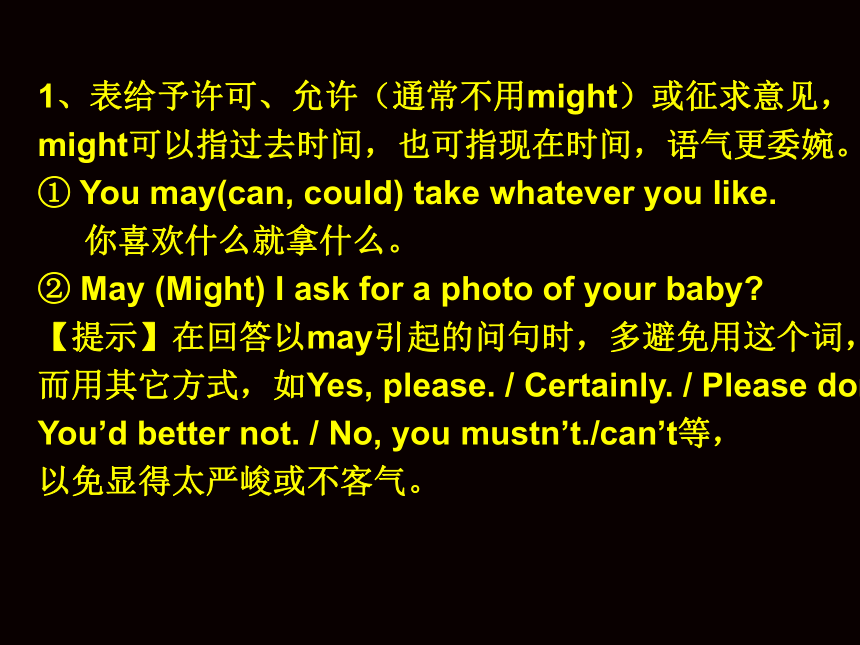
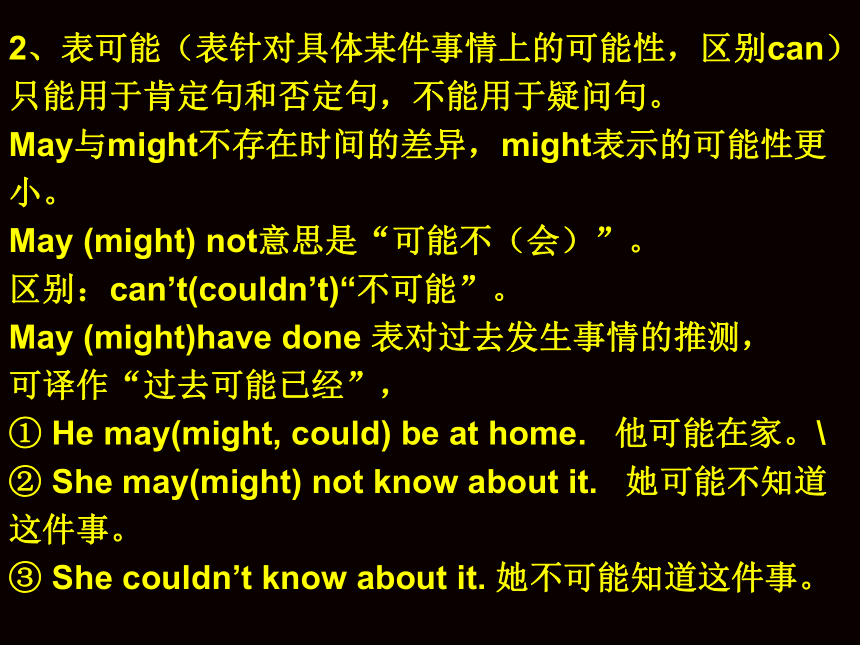
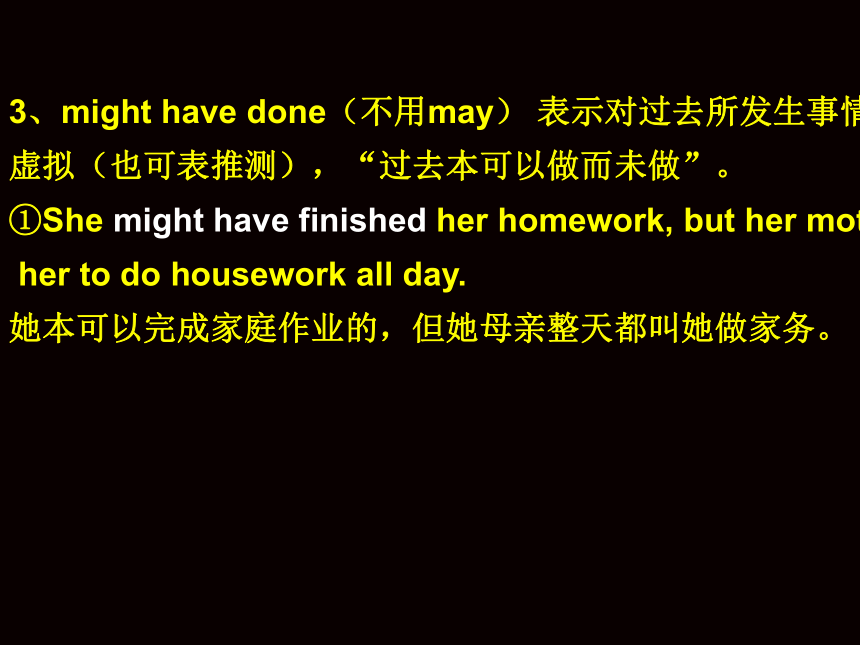
文档简介
课件50张PPT。Modal Verbs情态动词情态动词的语法特征情态动词除ought和have外,后面只能接不带to的不定式。
情态动词没有人称,数的变化,即情态动词第三人称单数不加-s。
情态动词没有非谓语形式,即没有不定式,分词等形式。情态动词有的情态助动词有现在时和过去时两种形式。
有的有现在时而无过去时。
有的有过去时而无现在时。can/could1、can表示能力,用在过去时中,could表示过去所具有
的一般的能力.
e.g. He can speak Spanish. 他会讲西班牙语。
When I was young, I could climb any tree in the wood.2、can表示可能(理论上或逻辑上判断),常用于否定句
和疑问句中。 Could 既可以表示过去的可能性,也可以表
示现在的可能性,语气比could弱。
e.g. That can’t be Mary—she is in hospital.
那不可能是玛丽,她在住院。
He said this news could be true. (过去的可能性)
Someone is knocking at the door. Who could it be?
(现在的可能性)
3. can(could) have done表示对过去发生事情的推测,
can have done只能用于疑问句和否定句中
(“可能已经……了吗” “不可能已经”),
肯定句中用“could have done”。
①Where can(could) he have gone?他会上哪儿去了呢?
②He can’t (couldn’t) have gone to school-it’s Saturday.
他不可能是去上学了,今天是星期六。
③He could have gone off with some friends.
他可能是和几位朋友出去了。(不说can have gone…)4、表示允许或征求意见(=may)。口语中常用can
① Can/Could I have a look at your new pen? ?
② He asked whether he could take the book out of the
reading—room. ?他问他可不可以把书带出阅览室 be able to与can 的比较
A) 表示能力时可通用
No one can / is able to do it.
Can you come tonight? /Will you be able to come tonight?
B) be able to可用于任何时态, can只能用在现在时或过去时( could )中。
I’m sorry I haven’t been able to answer your letter.
He says / said he will / would be able to come home for Christmas.
C) 表示经过努而成功地办到了某个具体的事情时,只能用be able to 不可用 can。
With the help of the firemen, they were able to leave the burning house.
After years of hard work he was able to win the prize may/ might1、表给予许可、允许(通常不用might)或征求意见,
might可以指过去时间,也可指现在时间,语气更委婉。
① You may(can, could) take whatever you like.
你喜欢什么就拿什么。
② May (Might) I ask for a photo of your baby?
【提示】在回答以may引起的问句时,多避免用这个词,
而用其它方式,如Yes, please. / Certainly. / Please don’t. /
You’d better not. / No, you mustn’t./can’t等,
以免显得太严峻或不客气。2、表可能(表针对具体某件事情上的可能性,区别can)
只能用于肯定句和否定句,不能用于疑问句。
May与might不存在时间的差异,might表示的可能性更小。
May (might) not意思是“可能不(会)”。
区别:can’t(couldn’t)“不可能”。
May (might)have done 表对过去发生事情的推测,
可译作“过去可能已经”,
① He may(might, could) be at home. ? 他可能在家。
② She may(might) not know about it. ? 她可能不知道这件事。
③ She couldn’t know about it. 她不可能知道这件事。3、might have done(不用may) 表示对过去所发生事情的
虚拟(也可表推测),“过去本可以做而未做”。
①She might have finished her homework, but her mother asked
her to do housework all day.
她本可以完成家庭作业的,但她母亲整天都叫她做家务。must1、表示义务。意为“必须”(主观意志)。
① We must do everything step by step. ?
我们一切都必须循序渐进地做。
② –Must we hand in our exercise books now?
我们现在就要交练习本吗?
--No, you needn’t. / No, you don’t have to.
--Yes, you must.2、表示推测。意为“想必、准是、一定”等,常指有根据
有把握的推测。只用于肯定句。
① He must be ill. He looks so pale. ?
他准是病了。他的脸色苍白。
② She’s wearing a diamond necklace. She must have a lot
of money. 她戴着钻石项链,一定很有钱。3、用于疑问句或条件句中,表说话人不耐烦、讨厌、
责备等语气,“必须得,非得,偏要,偏偏”。
(是其特有用法)
①Must you make so much noise when all of us are doing our
work quietly?
你非得在我们都安静工作的时候发出那么大的噪音吗?
②—How old are you, miss?
–-If you must know it, I’m older than you.
如果你非得要知道的话,我年纪比你大的。should/ought to1、表义务。意为“应该”(某件事宜于做),用于各种人称。
例如:should/ ought to① You ought to/ should be polite to your teachers. ?
你对老师应该有礼貌。
② You ought not to/ shouldn’t waste any time. ?
你不应该浪费时间。2、表推测,表示说话者根据一定的依据进行推测,意为“想必一定、照道理说应该、估计”等。
例如:should/ ought to① The film ought to/ should be very good as it is starring
first-class actors. ?
这部新电影是一流演员主演的,估计拍得很好。
② They ought to/ should be home by now. ?
照说他们现在应当已经到家了。3、should还可表示“惊讶”、竟然会、奇怪、遗憾、
必要性等语气,表示说话人惊奇、愤怒、失望等情感。
(是其独特的用法)。例如:should/ ought to① Don’t ask me. How should I know?
别问我,我怎么会知道?
② I don’t understand why he should have left without
saying goodbye to us.ought to (用法同should,不再累述)
其否定式在ought 后加not,疑问式将ought提前。例:He ought to hand in his homework by tomorrow morning.
(变否定式及疑问式)He ought not to hand in his homework by tomorrow morning.Ought he to hand in his homework by tomorrow morning?should/ ought towill/would1、表意愿,用于各种人称陈述句。
will 表示意愿用于现在时,would用于过去的情况,
would也可表示现在的意愿,但语气较委婉。
① I will do anything for you. ?
我愿为你做任何事。
② She sail she would try her best to help me.
她说她愿意尽最大努力来帮助我。
③ If you will read the book, I’ll lend it to you. ?
如果你愿意读这本书,我会把它借给你。will/would2、表请求,主要用于第二人称的疑问句中。
用won’t you加强邀请的语气。would比will更客气、委婉。
① Will you close the window? ? 请你把窗户关上好吗?
② Would you open the window, please?请打开窗户好吗?
③ Won’t you go and have a coffee with us?
怎么不和我们一起去喝杯咖啡?(加强邀请的语气)will/would3、表经常性、习惯性动作。will用于现在,
would用于过去,带有主观性,常译作“总是”。
① Rosa will always be late for school.
罗莎上学总迟到。
② She will ask very strange questions.
她总是问一些稀奇古怪的问题。
③ Mum would tell us stories before we went to bed.
过去妈妈在我们上床睡觉前总给我们讲故事。will/would4、will表示规律性的“注定会”。
① You will regret if you waste your time.
浪费时间,你一定会后悔的。
② Man will die without air.
没有空气,人注定会死亡。will/wouldshall1、表示征询意见。
主要用于主语是 第一、第三人称 的疑问句中。例:
① Shall I get you some tea? ? 我给你拿点茶好吗?
② Shall we meet at seven tomorrow morning?
我们明早七点见面好吗?
③ Shall the boy wait outside? ?让那男孩在外面等吗?
④ Shall Mary come in, sir? 先生,可以让玛丽进来吗?shall2、表示承诺或警告。
主要用于主语为 第二、第三人称 的陈述句中,表示说话人给对方的 许诺、命令、警告、威胁等。
① You shall get what you want if you behave well. (许诺)
如果表现好的话,你就会得到你想要的东西。
② You shall do as I say. 按我说的做。(命令)
③ He shall be sorry for it one day, I tell you.
有一天他会后悔的,我告诉你。(警告) shall3、表示“应该”、“必须”。
用于主语为 第三人称 的句子中,表示条约、规定、法令等中的义务,常译为“应、必须”。
① Students shall wear school uniforms in the school.
学生在学校应该穿校服。
② Each competitor shall wear a number.
每个参赛者要佩戴一个数字牌。shallneed/ dareneed的用法need作情态动词一般用于疑问句和否定句,不用于肯
定句,过去式和原形一样。1、在否定句中,表示“不必”。例如:
(1) You needn’t come if you are busy.
如果忙,你就不必来了。
(2) She said I needn’t pay until May.
她说我到五月份才需要付款。
2、在疑问句中,表示“需要”。这时肯定回答用
must,否定回答用needn’t。例如:
(1) –Need I come tomorrow?
--Yes, you .
--No, you .
(2) I wonder if I need bring a camera with me.
我不知道是否需要带一个相机。
need的用法mustneedn’tneed还可用作实意动词,表示需要,后可接名词,代词,
不定式、动名词等。例如:need的用法(1) All living things need water. 所有的生物都需要水。
(2) He needs to get some sleep. 他需要睡一会儿。
(3) The flowers need watering. 花儿需要浇水。
=The flowers need to be watered.按要求改写句子need的用法(1) He needs to do a lot of work. (改否定句,一般疑问句)(2) He doesn’t need to do a lot of work. (3) Does he need to do a lot of work?例题: ---Need I hand in my exercise book at once? ---Yes, you_____. A. must B. need C. can D. will析:选A。根据规定need用于一般疑问句作肯定回答应换成must,而作否定回答时,使用need的否定式needn’t。dare的用法dare用作情态动词,表示“敢”,没有人称形式,但有
过去式dared,主要用于否定句、疑问句、条件句。1、 用于否定句中,表示“不敢”。例如:
(1) I daren’t go out alone at night.
晚上我自己一个人不敢出去。
(2) I never dare drive a car. 我从不敢开车。dare的用法2、 用于疑问句及条件句中,表示“敢”。例如:
(1) How dare you speak to your father like that?
你怎么敢那样对你父亲说话呢?
(2) Dare you go out alone at night?
(3) I wonder whether she dared come home alone.
不知她是否敢独自回家。dare的用法3、 dare还可作实意动词,表示“敢”,其后接不定式。
在否定句和疑问句中,不定式符号to可省略。例如:(1) He dares to say “no”. 他敢于说“不”。
(2) I don’t dare (to) complain. 我不敢抱怨。
(3) Do you dare (to) swim in the river?
你敢在河里游泳吗?◆ I dare say 是习惯用法,也可写成 I daresay,意为“我认为”。例如:
I dare say you are a little angry. 我认为你有点生气了。dare的用法按要求改写句子(1) He dare tell the truth. (改否定句,一般疑问句) Dare he tell the truth? He daren’t tell the truth. (2) He dares to tell the truth. (改否定句,一般疑问句)He doesn’t dare to tell the truth. Does he dare to tell the truth?情态动词其他用法要点:1. cannot but + do sth. 表示“不得不,只好”。
E.g. I can not but choose to go .我只好去。
2. may well 和 may as well结构。
“may well +动词原形”是一种常用结构,意为“完全能,很可能,”相当于to be very likely to.
Eg. He may well be proud of his son.他大可为他的儿子感到自豪。
Her appearance has changed so much that you may well not recognize her.
她的模样变化太大,你很可能认不出她了。
“may as well + 动词原形”意为“最好,满可以,倒不如。”
E.g. You may as well do it at once.你最好马上就做这件事。
3.cannot (或never等否定词)与enough连用表示“再……也不为过。”
4.may 可以用于祈使句,表示祝愿。
E.g. May we never forget each other.愿我们彼此永不相忘。
5.Why/How +should结构表示说话人对某事不能理解、感到意外、惊异等意思,意为“竟会”。
E.g. Why should you be so late today?6.must表示“偏要、硬要”做某事。
E.g. Must you make so much noise?你非得弄出这么大声吗?
7.may 作“可以”讲时,其否定式常用“mustn’t表示“禁止”,must作“必须”讲时,其否定式是 “needn’t”,表示“不必”。
E.g. ---May I use your car?我可以用你的车吗?
--- No, you mustn’t.不,不行。
---Must I work out the problem tonight?
我今晚必须做出这道题吗?
---No, you needn’t.没必要。Now let's do some exercises. 例1:---Could I borrow your dictionary? ---Yes, of course you____. A. might B. will C. can D. should析:选C。该句用can的委婉表达式could 来征求对方意见,could 和might通用,但回答时必须要用can或may,因此该题不选A.例2:---Must I start at once? ---No, you____. A. needn’t B. mustn’t C. can’t D. won’t析:A。由语境可知该答句表示“不必”,而mustn’t表示“不准、禁止”,不符合语境,显然应使用needn’t表示“不必”,但肯定句回答继续用must。例3: ---Need I hand in my exercise book at once? ---Yes, you_____. A. must B. need C. can D. will析:选A。根据规定need用于一般疑问句作肯定回答应换成must,而作否定回答时,使用need的否定式needn’t。4.— The room is so dirty. _____ we clean it?
— Of course. (2003北京春) A. Will B. Shall C. Would D. Do
上题考查 shall的含义,当shall 用于一、三人称疑问句中时,表示征求对方意见;用于二、三人称陈述句中,表示说话人给对方的命令、警告、允诺或威胁等。 5. I wonder how he ____ that to the teacher.
A. dare to say B. dare saying
C. not dare say D. dared sayD6.As it turned out to be a small house party, we ____ so formally.
A needn’t dress
B. didn’t have to dress up
C. Might not have dressed up
D. needn’t have dressed upDThe End
情态动词没有人称,数的变化,即情态动词第三人称单数不加-s。
情态动词没有非谓语形式,即没有不定式,分词等形式。情态动词有的情态助动词有现在时和过去时两种形式。
有的有现在时而无过去时。
有的有过去时而无现在时。can/could1、can表示能力,用在过去时中,could表示过去所具有
的一般的能力.
e.g. He can speak Spanish. 他会讲西班牙语。
When I was young, I could climb any tree in the wood.2、can表示可能(理论上或逻辑上判断),常用于否定句
和疑问句中。 Could 既可以表示过去的可能性,也可以表
示现在的可能性,语气比could弱。
e.g. That can’t be Mary—she is in hospital.
那不可能是玛丽,她在住院。
He said this news could be true. (过去的可能性)
Someone is knocking at the door. Who could it be?
(现在的可能性)
3. can(could) have done表示对过去发生事情的推测,
can have done只能用于疑问句和否定句中
(“可能已经……了吗” “不可能已经”),
肯定句中用“could have done”。
①Where can(could) he have gone?他会上哪儿去了呢?
②He can’t (couldn’t) have gone to school-it’s Saturday.
他不可能是去上学了,今天是星期六。
③He could have gone off with some friends.
他可能是和几位朋友出去了。(不说can have gone…)4、表示允许或征求意见(=may)。口语中常用can
① Can/Could I have a look at your new pen? ?
② He asked whether he could take the book out of the
reading—room. ?他问他可不可以把书带出阅览室 be able to与can 的比较
A) 表示能力时可通用
No one can / is able to do it.
Can you come tonight? /Will you be able to come tonight?
B) be able to可用于任何时态, can只能用在现在时或过去时( could )中。
I’m sorry I haven’t been able to answer your letter.
He says / said he will / would be able to come home for Christmas.
C) 表示经过努而成功地办到了某个具体的事情时,只能用be able to 不可用 can。
With the help of the firemen, they were able to leave the burning house.
After years of hard work he was able to win the prize may/ might1、表给予许可、允许(通常不用might)或征求意见,
might可以指过去时间,也可指现在时间,语气更委婉。
① You may(can, could) take whatever you like.
你喜欢什么就拿什么。
② May (Might) I ask for a photo of your baby?
【提示】在回答以may引起的问句时,多避免用这个词,
而用其它方式,如Yes, please. / Certainly. / Please don’t. /
You’d better not. / No, you mustn’t./can’t等,
以免显得太严峻或不客气。2、表可能(表针对具体某件事情上的可能性,区别can)
只能用于肯定句和否定句,不能用于疑问句。
May与might不存在时间的差异,might表示的可能性更小。
May (might) not意思是“可能不(会)”。
区别:can’t(couldn’t)“不可能”。
May (might)have done 表对过去发生事情的推测,
可译作“过去可能已经”,
① He may(might, could) be at home. ? 他可能在家。
② She may(might) not know about it. ? 她可能不知道这件事。
③ She couldn’t know about it. 她不可能知道这件事。3、might have done(不用may) 表示对过去所发生事情的
虚拟(也可表推测),“过去本可以做而未做”。
①She might have finished her homework, but her mother asked
her to do housework all day.
她本可以完成家庭作业的,但她母亲整天都叫她做家务。must1、表示义务。意为“必须”(主观意志)。
① We must do everything step by step. ?
我们一切都必须循序渐进地做。
② –Must we hand in our exercise books now?
我们现在就要交练习本吗?
--No, you needn’t. / No, you don’t have to.
--Yes, you must.2、表示推测。意为“想必、准是、一定”等,常指有根据
有把握的推测。只用于肯定句。
① He must be ill. He looks so pale. ?
他准是病了。他的脸色苍白。
② She’s wearing a diamond necklace. She must have a lot
of money. 她戴着钻石项链,一定很有钱。3、用于疑问句或条件句中,表说话人不耐烦、讨厌、
责备等语气,“必须得,非得,偏要,偏偏”。
(是其特有用法)
①Must you make so much noise when all of us are doing our
work quietly?
你非得在我们都安静工作的时候发出那么大的噪音吗?
②—How old are you, miss?
–-If you must know it, I’m older than you.
如果你非得要知道的话,我年纪比你大的。should/ought to1、表义务。意为“应该”(某件事宜于做),用于各种人称。
例如:should/ ought to① You ought to/ should be polite to your teachers. ?
你对老师应该有礼貌。
② You ought not to/ shouldn’t waste any time. ?
你不应该浪费时间。2、表推测,表示说话者根据一定的依据进行推测,意为“想必一定、照道理说应该、估计”等。
例如:should/ ought to① The film ought to/ should be very good as it is starring
first-class actors. ?
这部新电影是一流演员主演的,估计拍得很好。
② They ought to/ should be home by now. ?
照说他们现在应当已经到家了。3、should还可表示“惊讶”、竟然会、奇怪、遗憾、
必要性等语气,表示说话人惊奇、愤怒、失望等情感。
(是其独特的用法)。例如:should/ ought to① Don’t ask me. How should I know?
别问我,我怎么会知道?
② I don’t understand why he should have left without
saying goodbye to us.ought to (用法同should,不再累述)
其否定式在ought 后加not,疑问式将ought提前。例:He ought to hand in his homework by tomorrow morning.
(变否定式及疑问式)He ought not to hand in his homework by tomorrow morning.Ought he to hand in his homework by tomorrow morning?should/ ought towill/would1、表意愿,用于各种人称陈述句。
will 表示意愿用于现在时,would用于过去的情况,
would也可表示现在的意愿,但语气较委婉。
① I will do anything for you. ?
我愿为你做任何事。
② She sail she would try her best to help me.
她说她愿意尽最大努力来帮助我。
③ If you will read the book, I’ll lend it to you. ?
如果你愿意读这本书,我会把它借给你。will/would2、表请求,主要用于第二人称的疑问句中。
用won’t you加强邀请的语气。would比will更客气、委婉。
① Will you close the window? ? 请你把窗户关上好吗?
② Would you open the window, please?请打开窗户好吗?
③ Won’t you go and have a coffee with us?
怎么不和我们一起去喝杯咖啡?(加强邀请的语气)will/would3、表经常性、习惯性动作。will用于现在,
would用于过去,带有主观性,常译作“总是”。
① Rosa will always be late for school.
罗莎上学总迟到。
② She will ask very strange questions.
她总是问一些稀奇古怪的问题。
③ Mum would tell us stories before we went to bed.
过去妈妈在我们上床睡觉前总给我们讲故事。will/would4、will表示规律性的“注定会”。
① You will regret if you waste your time.
浪费时间,你一定会后悔的。
② Man will die without air.
没有空气,人注定会死亡。will/wouldshall1、表示征询意见。
主要用于主语是 第一、第三人称 的疑问句中。例:
① Shall I get you some tea? ? 我给你拿点茶好吗?
② Shall we meet at seven tomorrow morning?
我们明早七点见面好吗?
③ Shall the boy wait outside? ?让那男孩在外面等吗?
④ Shall Mary come in, sir? 先生,可以让玛丽进来吗?shall2、表示承诺或警告。
主要用于主语为 第二、第三人称 的陈述句中,表示说话人给对方的 许诺、命令、警告、威胁等。
① You shall get what you want if you behave well. (许诺)
如果表现好的话,你就会得到你想要的东西。
② You shall do as I say. 按我说的做。(命令)
③ He shall be sorry for it one day, I tell you.
有一天他会后悔的,我告诉你。(警告) shall3、表示“应该”、“必须”。
用于主语为 第三人称 的句子中,表示条约、规定、法令等中的义务,常译为“应、必须”。
① Students shall wear school uniforms in the school.
学生在学校应该穿校服。
② Each competitor shall wear a number.
每个参赛者要佩戴一个数字牌。shallneed/ dareneed的用法need作情态动词一般用于疑问句和否定句,不用于肯
定句,过去式和原形一样。1、在否定句中,表示“不必”。例如:
(1) You needn’t come if you are busy.
如果忙,你就不必来了。
(2) She said I needn’t pay until May.
她说我到五月份才需要付款。
2、在疑问句中,表示“需要”。这时肯定回答用
must,否定回答用needn’t。例如:
(1) –Need I come tomorrow?
--Yes, you .
--No, you .
(2) I wonder if I need bring a camera with me.
我不知道是否需要带一个相机。
need的用法mustneedn’tneed还可用作实意动词,表示需要,后可接名词,代词,
不定式、动名词等。例如:need的用法(1) All living things need water. 所有的生物都需要水。
(2) He needs to get some sleep. 他需要睡一会儿。
(3) The flowers need watering. 花儿需要浇水。
=The flowers need to be watered.按要求改写句子need的用法(1) He needs to do a lot of work. (改否定句,一般疑问句)(2) He doesn’t need to do a lot of work. (3) Does he need to do a lot of work?例题: ---Need I hand in my exercise book at once? ---Yes, you_____. A. must B. need C. can D. will析:选A。根据规定need用于一般疑问句作肯定回答应换成must,而作否定回答时,使用need的否定式needn’t。dare的用法dare用作情态动词,表示“敢”,没有人称形式,但有
过去式dared,主要用于否定句、疑问句、条件句。1、 用于否定句中,表示“不敢”。例如:
(1) I daren’t go out alone at night.
晚上我自己一个人不敢出去。
(2) I never dare drive a car. 我从不敢开车。dare的用法2、 用于疑问句及条件句中,表示“敢”。例如:
(1) How dare you speak to your father like that?
你怎么敢那样对你父亲说话呢?
(2) Dare you go out alone at night?
(3) I wonder whether she dared come home alone.
不知她是否敢独自回家。dare的用法3、 dare还可作实意动词,表示“敢”,其后接不定式。
在否定句和疑问句中,不定式符号to可省略。例如:(1) He dares to say “no”. 他敢于说“不”。
(2) I don’t dare (to) complain. 我不敢抱怨。
(3) Do you dare (to) swim in the river?
你敢在河里游泳吗?◆ I dare say 是习惯用法,也可写成 I daresay,意为“我认为”。例如:
I dare say you are a little angry. 我认为你有点生气了。dare的用法按要求改写句子(1) He dare tell the truth. (改否定句,一般疑问句) Dare he tell the truth? He daren’t tell the truth. (2) He dares to tell the truth. (改否定句,一般疑问句)He doesn’t dare to tell the truth. Does he dare to tell the truth?情态动词其他用法要点:1. cannot but + do sth. 表示“不得不,只好”。
E.g. I can not but choose to go .我只好去。
2. may well 和 may as well结构。
“may well +动词原形”是一种常用结构,意为“完全能,很可能,”相当于to be very likely to.
Eg. He may well be proud of his son.他大可为他的儿子感到自豪。
Her appearance has changed so much that you may well not recognize her.
她的模样变化太大,你很可能认不出她了。
“may as well + 动词原形”意为“最好,满可以,倒不如。”
E.g. You may as well do it at once.你最好马上就做这件事。
3.cannot (或never等否定词)与enough连用表示“再……也不为过。”
4.may 可以用于祈使句,表示祝愿。
E.g. May we never forget each other.愿我们彼此永不相忘。
5.Why/How +should结构表示说话人对某事不能理解、感到意外、惊异等意思,意为“竟会”。
E.g. Why should you be so late today?6.must表示“偏要、硬要”做某事。
E.g. Must you make so much noise?你非得弄出这么大声吗?
7.may 作“可以”讲时,其否定式常用“mustn’t表示“禁止”,must作“必须”讲时,其否定式是 “needn’t”,表示“不必”。
E.g. ---May I use your car?我可以用你的车吗?
--- No, you mustn’t.不,不行。
---Must I work out the problem tonight?
我今晚必须做出这道题吗?
---No, you needn’t.没必要。Now let's do some exercises. 例1:---Could I borrow your dictionary? ---Yes, of course you____. A. might B. will C. can D. should析:选C。该句用can的委婉表达式could 来征求对方意见,could 和might通用,但回答时必须要用can或may,因此该题不选A.例2:---Must I start at once? ---No, you____. A. needn’t B. mustn’t C. can’t D. won’t析:A。由语境可知该答句表示“不必”,而mustn’t表示“不准、禁止”,不符合语境,显然应使用needn’t表示“不必”,但肯定句回答继续用must。例3: ---Need I hand in my exercise book at once? ---Yes, you_____. A. must B. need C. can D. will析:选A。根据规定need用于一般疑问句作肯定回答应换成must,而作否定回答时,使用need的否定式needn’t。4.— The room is so dirty. _____ we clean it?
— Of course. (2003北京春) A. Will B. Shall C. Would D. Do
上题考查 shall的含义,当shall 用于一、三人称疑问句中时,表示征求对方意见;用于二、三人称陈述句中,表示说话人给对方的命令、警告、允诺或威胁等。 5. I wonder how he ____ that to the teacher.
A. dare to say B. dare saying
C. not dare say D. dared sayD6.As it turned out to be a small house party, we ____ so formally.
A needn’t dress
B. didn’t have to dress up
C. Might not have dressed up
D. needn’t have dressed upDThe End
